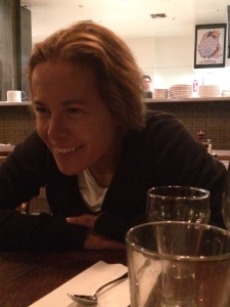
https://arizona.zoom.us/j/3871331723
Maria Letizia Bellocchio - Director of Basic Language, Italian
Ph.D. University of Siena (2007) and Ph.D. Rutgers University (2014). Laurea in English Theatre at the University of Milan (2001). Dr. Bellocchio arrived at the University of Arizona in 2016, after being Visiting Assistant Professor at Wesleyan University. Her Italian Ph.D. dissertation examined the Shakespearean influences on the theatre (prose and opera) and cinema of Luchino Visconti. Her US research focused on the history of Italian cinema by concentrating on its depictions of the family, civil society and law. Her current book explores the tension between tradition and innovation in the filmic construction of the politics, practices and symbolic values of the Italian family. Her areas of expertise include Film Studies, 19-20-21 century Italian Literature and Theatre, Intermediality, Italian Family Law.
PUBLICATIONS
BOOKS
Italian Business. Money and Culture in Post-War Italy. Special Issue of Italian Quarterly. Letizia Bellocchio and Francesca Cadel eds. (2017).
Finestre, Atti della Scuola Europea di Studi Comparati Synapsis 2004. Letizia Bellocchio ed. Firenze: Le Monnier 2006.
PEER-REFEREED ARTICLES & CHAPTERS IN SCHOLARLY BOOKS
“Gli imprenditori italiani in Visconti, Rosi, Moretti, Francesca Comencini, e Molaioli.” Italian Quarterly – Special Issue: Italian Business. Money and Culture in Post-War Italy. Letizia Bellocchio and Francesca Cadel eds. (2017): 17-32.
“Francesca Comencini’s Single Moms and Family Law.” Italian Motherhood on Screen. Giovanna Faleschini and Maria Elena Damelio eds. London: Palgrave Macmillan. 2017. 157-174.
“Dreams, Nightmares and Hallucinations in Francesca Comencini’s Films.” Dreamscapes in Italian Cinema. Francesco Pascuzzi and Bryan Cracchiolo eds. FDU Press. 2014. 147-158.
“Difficult Years for Anni difficili by Luigi Zampa (1948).” NeMLA Italian Studies – Volume XXXIV (2014) – Special Issue: Italy in WWII and the Transition to Democracy: Memories, Fictions, Histories. Franco Baldasso ed. 155-171.
“Otello di Visconti. Un viaggio a ritroso da Verdi a Shakespeare a Giraldi Cinzio.” Atti del Convegno La macchina e le Muse. Luchino Visconti, le arti, la storia. Federica Mazzocchi ed. Bari: Edizioni di Pagina 2008. 69-89.
“Il Medioevo nei Macbeth cinematografici (Welles, Kurosawa, Polanski, Visconti).” Doctor Virtualis. (December 2006): 9-22.
“Identificazione e straniamento in Ossessione e La terra trema.” Letizia Bellocchio, Mauro Giori, Tomaso Subini. Guarda bene, fratellino, guarda bene. Kubrick, Pasolini, Visconti. Milano: CUEM 2005. 53-67.
“Ossessione. Il primo film.” Luchino Visconti. Raffaele De Berti ed. Milano: CUEM 2005. 7-28.
“Il montaggio intellettuale.” Letizia Bellocchio and Sara Criscuolo. Il montaggio non indifferente. Il problema della forma nel cinema di S. M. Ejzenštejn. Milano: CUEM 2003. 7-28.
“Il montaggio nel cinema sonoro.” Letizia Bellocchio and Sara Criscuolo. Il montaggio non indifferente. Il problema della forma nel cinema di S. M. Ejzenštejn. Milano: CUEM 2003. 75-92.
BOOK REVIEWS
“Il cinema di Marco Tullio Giordana: interventi critici.” Journal of Italian Cinema and Media Studies vol. 5 n. 3 (2017): 416-8 .
WORKS IN PROGRESS
Kinship and Family Law in Italian Film (monograph)
Visconti and Shakespeare. Cinema and Theatre (monograph)
“Cinema and The Italian Family Law since 1960.” The Interplay of Law and Literature in the Italian Tradition. Bernardo Piciché ed. Forum Italicum Special Volume 2019.

